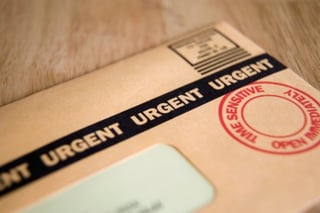 Most of the potential clients our MN Bankruptcy Lawyers meet with at Kain & Scott have defaulted on at least one of the accounts they hold. For many of the people I meet, they have been able to stay current on some accounts, but because of their financial circumstances, they have not been able to maintain current payments on all of their accounts.
Most of the potential clients our MN Bankruptcy Lawyers meet with at Kain & Scott have defaulted on at least one of the accounts they hold. For many of the people I meet, they have been able to stay current on some accounts, but because of their financial circumstances, they have not been able to maintain current payments on all of their accounts.
Many clients who become overextended financially have set payment priorities: the clients are current on their home mortgage payments and car loans, since they recognize the necessity of retaining their home and their car. Other accounts, though, are past-due. Some accounts have been “charged off” by the creditor, and are now in collection with a collection agency or debt buyer, and these collectors are relentless in their demands for payment.
Some of the people with whom I meet have defaulted on all of their credit accounts, including their home mortgages or rent payments, and their car loans. They are not just looking at calls from collectors on defaulted credit card or medical debt, they are also facing the possibility of foreclosure, eviction and/or repossession.
For clients who have defaulted on some, or all of their credit accounts, a MN Bankruptcy Lawyer can help them restore financial order to their lives. But many clients who should, objectively, file a bankruptcy case, hesitate to do so; the client thinks about the fact that he is causing banks and companies that extended him credit a loss. Filing bankruptcy to, in essence, walk away from debts that were knowingly and intentionally incurred, feels “wrong.” And for some clients, this feeling prevents them from making the affirmative decision to file a bankruptcy case.
Are clients correct to feel this way? To find the answer, let’s take a deeper look at what happens when a credit account defaults.
Late Payment or Default?
First, let’s define our terms. There’s a difference between being late with payments and being in default. Another term for late payment is delinquency. Late payments that are noted on credit accounts are exactly that: the payment was made, but the payment was made after the due date for the payment. Late payments are noted on credit reports - sometimes with a temporal note, also - such as “2 payments 30 days or more late.”
Default is significant non-payment: usually the non-payment has to be for six months or more before a creditor will report a borrower as having a loan in default.
When payments are late, most creditors will start collecting on the accounts by sending late payment notices to customers. Failure by a customer to catch up on payments can lead to more direct collection activity - such as phone calls. When customers reach out to lenders when the customer becomes delinquent, the lender will almost always work with the customer to set up a payment plan to get the customer out of delinquency.
Creditors track delinquency information. Nationally, about 2% of all home loans are 90 days (or more) delinquent, 3% of all retail charge cards are behind by 90 days, 4% of auto loans are at least 90 days late, 7% of all revolving credit cards are 90 days delinquent, and approximately 11% of all student loans are delinquent. While the percentages are not large, when you t ake into account the size of the economy of the United States, it’s easy to understand that 2% or 3% delinquency rates involve a significant number of accounts. But remember that these statistics relate to late payments - creditors on delinquent accounts believe they will eventually get paid - it’s just that the customer is not paying on time.
But when no payment has been made, despite collection attempts, and the delinquency is approaching, or passing, six months, many creditors will declare the account as in default.
The Creditor’s Choice Upon Default
When this happens, a creditor will make a choice: formally attempt to collect the debt through legal process, or “charge off” the debt and declare the debt as bad debt for tax purposes and refer the account to a third party - usually a collection agency or debt buying company - for collection.
Most clients understand that first choice that a creditor can make. The account is turned over to a law firm for collection through a lawsuit and civil judgment, or a foreclosure proceeding. The creditor makes this choice when the creditor believes that a significant portion of the account or loan balance, or mortgage balance, can be recovered through formal legal processes. In cases like this, the home that is collateral for the mortgage has equity, or the customer that is obligated to pay on a defaulted credit account has sufficient income or assets that the creditor will collect most, if not all of the defaulted balance.
There’s a reason, though, that many accounts go into default - and that is that there has been a significant financial reverse in a customer’s life - the breakup of a marriage, job loss, business failure - that makes the account difficult to collect. In circumstances like this, the creditor may choose to “charge off” the account. That is, the creditor deems the account uncollectible and assigns the right to collect on the account to a collection agency or debt buyer. In these situations, the original creditor will list the defaulted account as bad debt, which will allow the creditor the ability (if the creditor chooses - more about that later) to deduct the defaulted balance from the income the creditor declares for income tax purposes.
In some cases where defaulted accounts are charged off, the original creditor’s deal with the debt buyer is that the creditor will be paid “up front” by the debt buyer for the accounts. In this situation, the debt buyer will keep all of the money it can collect from the customer/borrower on the account.
In other circumstances, the collection agency works on a percentage basis: the collector keeps a pre-determined percentage of the debt that is recovered; the original creditor gets the rest.
In this circumstance, if the original creditor receives money on an account that was charged off, that “found money” is taxable as income.
So either through tax deductions, the sales of accounts, or the partial recovery of defaulted accounts, there’s a way for creditors to make up for losses due to defaulted accounts. But this all presumes that the customer/borrower who has defaulted does not file a bankruptcy case. What happens with defaults that end up being discharged with the help of a MN Bankruptcy Lawyer? That’s what I will write about in next week’s blog.


